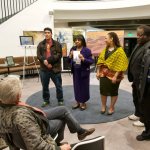Meet Lizzie Rodriguez, MA
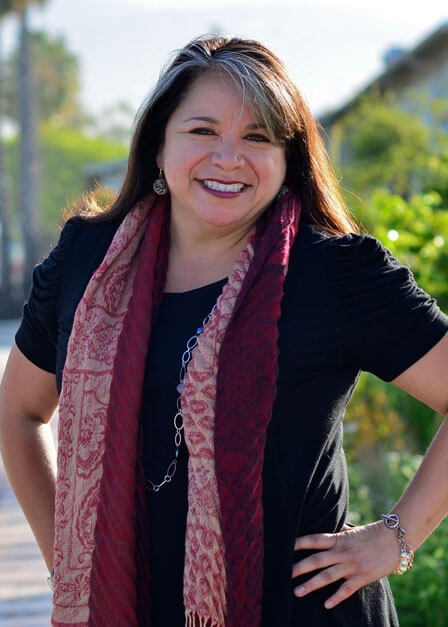 Lizzie Rodriguez (she/her) is an alumna of Pacifica’s MA in Depth Psychology (with an emphasis in Community Psychology, Liberation Psychology and Eco-psychology) program. She is a force of spirit, compassion and commitment, who shares her leadership and talents locally and beyond. Lizzie’s fieldwork research took her to Rwanda where she conducted program evaluation and ethnographic research on the sustainable impact of reconciliation workshops in post conflict settings. Lizzie continues to return to Rwanda as an International Train the Trainers Facilitator for the Healing and Rebuilding Our Communities (HROC) reconciliation program. As a student, she became a member of the Society for Community Research and Action, where she presented her research at conferences, received a community grant, and was a finalist for their 2012 video contest, depicting community psychologist working in the field. Lizzie was also a recipient of the Herman Warsh Scholarship and Opus Archives 2012 Peace and Reconciliation Travel Grant. In 2016, she received the PGIAA’s Wendy Davee Award for Service. Lizzie was one of the original members of Pacifica’s Diversity and Inclusion Committee.
Lizzie Rodriguez (she/her) is an alumna of Pacifica’s MA in Depth Psychology (with an emphasis in Community Psychology, Liberation Psychology and Eco-psychology) program. She is a force of spirit, compassion and commitment, who shares her leadership and talents locally and beyond. Lizzie’s fieldwork research took her to Rwanda where she conducted program evaluation and ethnographic research on the sustainable impact of reconciliation workshops in post conflict settings. Lizzie continues to return to Rwanda as an International Train the Trainers Facilitator for the Healing and Rebuilding Our Communities (HROC) reconciliation program. As a student, she became a member of the Society for Community Research and Action, where she presented her research at conferences, received a community grant, and was a finalist for their 2012 video contest, depicting community psychologist working in the field. Lizzie was also a recipient of the Herman Warsh Scholarship and Opus Archives 2012 Peace and Reconciliation Travel Grant. In 2016, she received the PGIAA’s Wendy Davee Award for Service. Lizzie was one of the original members of Pacifica’s Diversity and Inclusion Committee.
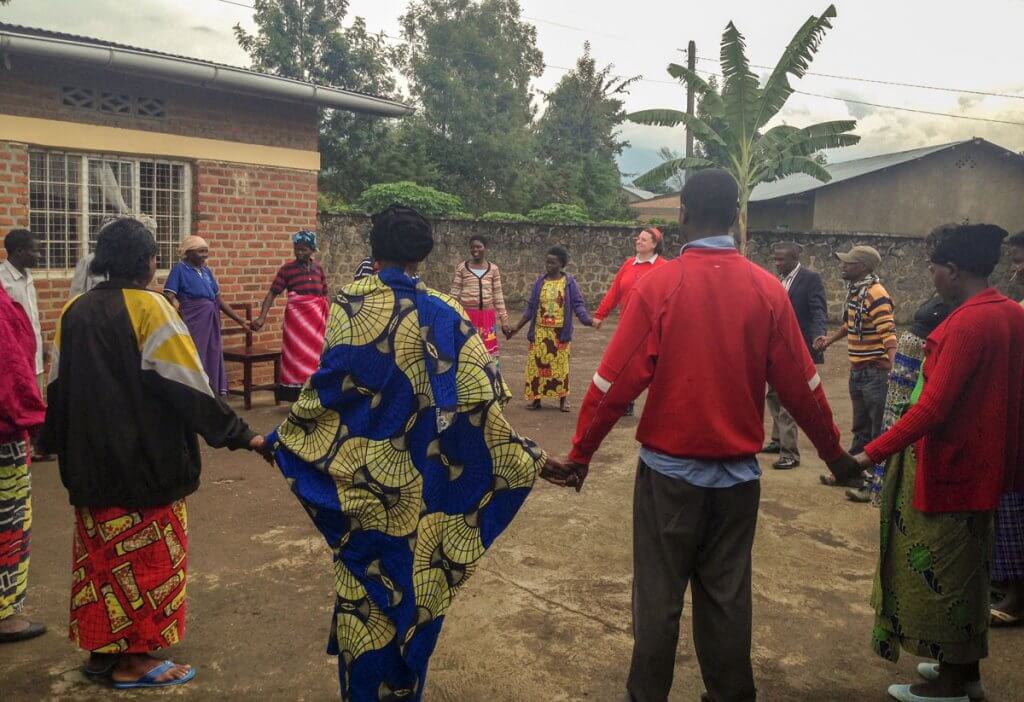 Shortly after graduating from Pacifica, Lizzie founded the Restorative Community Network, a coalition of individuals and organizations committed to working together to address the complex social issues contributing to community harm or crime. The purpose of the RCN is to advocate for the use of restorative practices in the justice system, educational system, and community program and services. The long-term goal of the RCN is system and policy change toward a sustainable and inclusive model of community services through the promotion of restorative practices and collaborative partnerships.
Shortly after graduating from Pacifica, Lizzie founded the Restorative Community Network, a coalition of individuals and organizations committed to working together to address the complex social issues contributing to community harm or crime. The purpose of the RCN is to advocate for the use of restorative practices in the justice system, educational system, and community program and services. The long-term goal of the RCN is system and policy change toward a sustainable and inclusive model of community services through the promotion of restorative practices and collaborative partnerships.
Through the Alternatives to Violence Project, Lizzie volunteers at the Lompoc Federal Penitentiary along with other 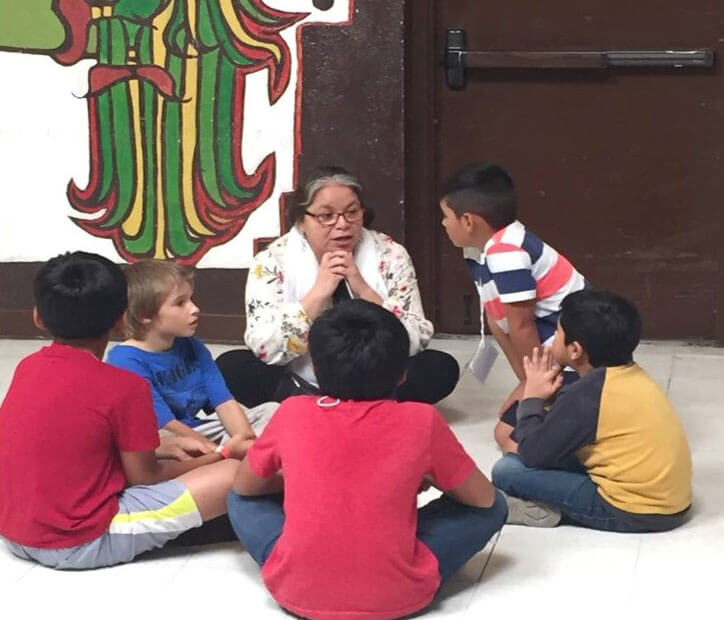 Pacifica alumni and faculty facilitating experiential conflict resolution workshops. She provided similar programs for incarcerated youth and youth involved in the probation system. As a trained mediator and trauma informed restorative practitioner, Lizzie works in communities, schools, government, courts, and detention facilities. She offers consultation on cultural proficiency and provides trainings on implicit bias and developing anti-racist policies. Lizzie teaches at Santa Barbara Community College; and, was recently appointed to the Diversity, Inclusion, Equity Resolution Committee tasked with revising the colleges’ board policies and administrative procedures to include anti-racist policies. She is bringing her experience back to Pacifica as one of two alumni representatives to the Diversity, Inclusion, and Equity Task Force.
Pacifica alumni and faculty facilitating experiential conflict resolution workshops. She provided similar programs for incarcerated youth and youth involved in the probation system. As a trained mediator and trauma informed restorative practitioner, Lizzie works in communities, schools, government, courts, and detention facilities. She offers consultation on cultural proficiency and provides trainings on implicit bias and developing anti-racist policies. Lizzie teaches at Santa Barbara Community College; and, was recently appointed to the Diversity, Inclusion, Equity Resolution Committee tasked with revising the colleges’ board policies and administrative procedures to include anti-racist policies. She is bringing her experience back to Pacifica as one of two alumni representatives to the Diversity, Inclusion, and Equity Task Force.
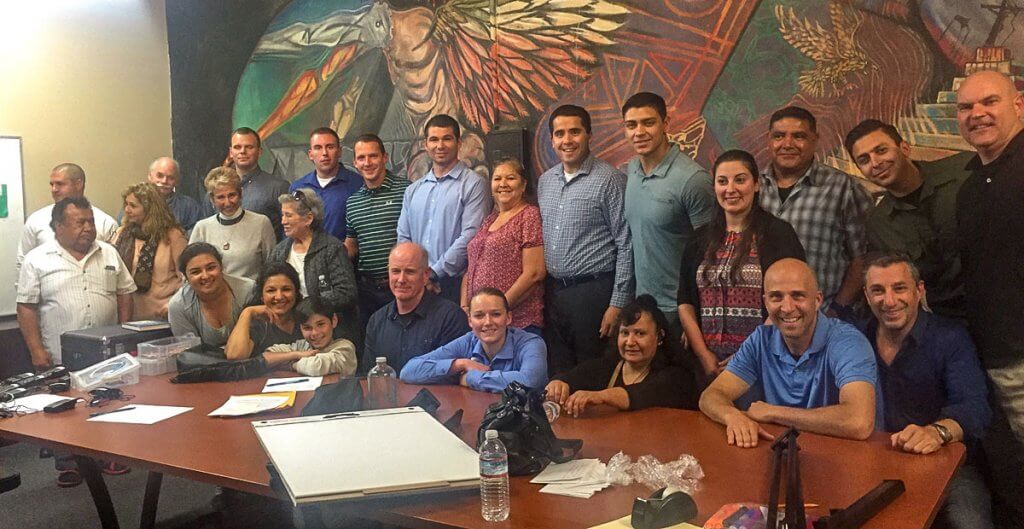 In 2016, following the killing of Alton Sterling and Philando Castile at the hands of law enforcement Lizzie urged the city of Santa Barbara to implement a robust training program addressing implicit bias and other strategies that would aid in the prevention of the unnecessary killing of community members of color. Shortly afterwards she began partnering with the Santa Barbara Police Department including co-facilitating Voices, a restorative dialogue program designed to bring together new officers and community members who have been negatively impacted by law enforcement for the purpose of learning, healing, and trust building. Lizzie was appointed to the City’s Fire and Police Commission in 2018 after organizing efforts to fund Spanish language communications during emergency situations, which has since become a state recognized essential service mandated in every county in the state of California. In 2020, she was named Vice Chair of the Santa Barbara Fire & Police Commission. Lizzie strongly believes that in order to create meaningful and just policies, we need informed change agents within the system in addition to powerful activists in the community, “resistance also means having at seat the table where decisions are made.”
In 2016, following the killing of Alton Sterling and Philando Castile at the hands of law enforcement Lizzie urged the city of Santa Barbara to implement a robust training program addressing implicit bias and other strategies that would aid in the prevention of the unnecessary killing of community members of color. Shortly afterwards she began partnering with the Santa Barbara Police Department including co-facilitating Voices, a restorative dialogue program designed to bring together new officers and community members who have been negatively impacted by law enforcement for the purpose of learning, healing, and trust building. Lizzie was appointed to the City’s Fire and Police Commission in 2018 after organizing efforts to fund Spanish language communications during emergency situations, which has since become a state recognized essential service mandated in every county in the state of California. In 2020, she was named Vice Chair of the Santa Barbara Fire & Police Commission. Lizzie strongly believes that in order to create meaningful and just policies, we need informed change agents within the system in addition to powerful activists in the community, “resistance also means having at seat the table where decisions are made.”
As a lesbian-identified Latina, Lizzie represents the diversity we hope to see more of at Pacifica and her work in the community reflects not only what it means to tend the soul of the world, but also what it means to make meaningful change in the world.




